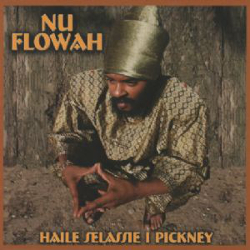Articles about reggae music, reviews, interviews, reports and more...
Nu Flowah - Haile Selassie I Pickney

Nu Flowah - Haile Selassie I Pickney
Nu Flowah blossoms on this independent album
Sampler
South London Rasta deejay Nu Flowah – a transliteration of Addis Ababa – is a little ball of fire. Born Richard Wallace, he was inspired by growing up next door to the great Alton Ellis and has been on the UK scene for many years, opening for visiting Jamaican artists when they come to town. With his stocky stature, turban and growling, higher register voice he is very much a product of the roots revival that sprung up in the 90s.
His third album Haile Selassie I Pickney, released on September 23rd digitally and October 28th on CD, represents a subtle refinement and consolidation of his own sincere and uncompromising brand of roots reggae. A completely independent release, it is his most considered, mature and complete project to date.
 The majority of rhythms are self-produced via his Kings Highway Records production company - with mixing duties from Russ D of Disciples. Additionally there are two productions – Think Twice and Sunshine - from Aston Familyman Barrett’s son Floyd’s Famshouse. These in particular have a Bob Marley-ish feel - however Flowah’s fierce and earnest deejay delivery means there is never any danger of pastiche.
The majority of rhythms are self-produced via his Kings Highway Records production company - with mixing duties from Russ D of Disciples. Additionally there are two productions – Think Twice and Sunshine - from Aston Familyman Barrett’s son Floyd’s Famshouse. These in particular have a Bob Marley-ish feel - however Flowah’s fierce and earnest deejay delivery means there is never any danger of pastiche.
We also hear not one but two appearances by the veteran chanter Big Youth – a testimony to Nu Flowah’s standing in the music fraternity. The first is Bible Stories Remix: on a wicked Matic Horns drenched relick of Max Romeo’s If Them Ever. The second is closing Grounation chant Salvation Story featuring some almost pure singing by Jah Youth. Other strong tracks include the self-determining Weh Dem A Say on a Mad Professor and Black Steel remake of Max’s I Chase The Devil, and Call on Jah Name utilising a cut of the late John Holt’s Quiet Place.
Like Anthony B or Chuck Fenda, Nu Flowah is not a melodic sounding vocalist in the traditional sense of the word. Therefore it may take a couple of listens for newcomers or those raised on Autotune to tap in to the inner ear of what he is saying. Yet, possessing a consistent sound across its rhythms as much as budget will allow, this is a good example of the “take it or leave it” cultural Rastaman tradition stretching back through the nineties to the seventies and beyond. Roots music without apology from start to finish, this is Nu Flowah’s blossoming album and deserves to be heard.
Read more about this topic
Comments actually desactivated due to too much spams
Browse by categories
Recommended Articles
Latest articles
Recently addedView all
© 2007-2026 United Reggae. All Rights Reserved. Reproduction in whole or in part is prohibited. Read about copyright
Terms of use | About us | Contact us | Authors | Newsletter | A-Z














